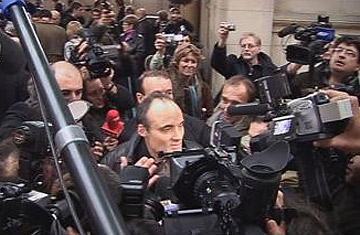
It's Hard Being Loved By Jerks (C'est dur d'etre aime par des cons)
There's a new epic form of movies: the documentary. There, and not in most Hollywood narratives, is where you find huge issues and outsize personalities. Truth isn't always stranger than a Marvel comics movie, but it's often more complex and compelling. If nonfiction can outsell novels on the best-seller lists, and 60 Minutes stay near the top of the TV ratings for 40 years, why can't real stories on the movie screen seem more vivid than invented ones?
At this year's Cannes film festival, the first consensus critical hit was Waltz from Bashir, an animated documentary about middle-aged Israeli men haunted by their wartime Army service. In a few days we'll see a bio-pic on soccer legend Diego Maradonna, from two-time Palme d'Or winner Emir Kusturica. Today brought three docs from three continents: James Toback's Tyson, an extended interview (plus copious fight clips) with the former heavyweight champ; Daniel Leconte's It's Hard Being Loved by Jerks, about a French magazine brought to court for defaming Islam; and Jia Zhangke's 24 City, on the lives of three generations of factory workers in China.
There's enough drama, comedy and heartbreak in this trio to keep festivalgoers satisfied until Sunday, when Hollywood gets one last chance to prove that old-fashioned adventure has a place in Cannes — when Indiana Jones and the Kingdom of the Crystal Skull has its world premiere. (Check back tomorrow for an early scoop on Indy's latest crusade)
TYSON
The trick of any one-man documentary is the personality of the subject: a powerful voice that brings perspective to an unusual life story. Tyson has all that. A poor Brooklyn kid who was led early by childhood friends ("Very few of them are functioning adults right now"), he was a 12-year-old in a detention home when trainer-manager Cus d'Amato became his surrogate father, raising Mike with the d'Amato family, giving the boy focus and purpose as a boxer ("He broke me down and rebuilt me"). Tyson was an apt pupil: he obsessively studied old films of boxing legends, learned the spiritual side of the warrior mentality and, he says, "restrained myself from having sex for about five years." He tore through the amateur ranks, knocking out one opponent in a record eight seconds, and was heavyweight champ before he was 21.
Toback, who for 30 years has directed movies about extreme characters seeking Nirvana through self-destruction, has always been fascinated by athlete-studs; his memoir of football icon Jim Brown still curdles the memory. So Tyson can't help but hit Toback's sweet spot: the fighter is smart, reflective and scary, even as he reminisces about his time in the ring. There he was a terror, an implacable mix of speed and strength. "Once in the ring," he says, "I'm God." Or a more satanic force, giving the evil eye to his adversary as he enters the ring, then devastating him with "One, two, three punches. I'm throwin punches in bunches." A long line of opponents surrendered to his lasered rage; they toppled like Wooden-Soldier Rockettes in the Radio City Music Hall Christmas Pageant. More than Joe Lewis or Marciano or Ali, Tyson seemed set for an uninterrupted 15-year reign.
But how to stay hungry when you're dining on caviar, sycophancy and willing women? Everyone wanted to spend time with the champ. ("I met the President of Istanbul.") Raised by a prostitute mother, deprived of his father figure when d'Amato died before Tyson won the title, he dreamed of creating his own family, but his marriage to actress Robin Givens — and her relating of his supposed brutalities in a joint interview with Barbara Walters — was his first sensational humiliation. The teenage celebate needed to dominate women by the dozens, the hundreds, though he says that what he really wanted in a woman was "loyalty, companionship, friendship, ferociousness." He sees himself as essentially selfless in bed: "I don't like being loved; I like loving. I have too much love to give; I don't want to accept it." That sounds more like the need to control, dominate, set the terms for sexual combat.
He's not so chivalrous toward the young woman whose testimony in a rape trial sent him to jail for three years: "that wretched swine of a woman, Desiree Washington." Nor does he have fond memories of manager Don King, whom he accused of stealing millions from him, and he beat up and stomped down at the Beverly Hills Hotel: "a wretched, slimy, reptilian motherf----r." Nor of the entourage a kid from the streets attracts when he becomes a rich dude with no sense of fiscal moderation: "They suck my blood and suck my blood, then sell it back to me and suck it again."
After prison he returned to the ring with facial tattoos of a Maori warrior, and images of Mao and Che on his body. But those were only emblems of the focused ferocity that used to be inside him, of the burning concentration that made him a champ. Tyson lost his last chance at a championship by notoriously snacking on Evander Holyfield's ear. A couple years later, he ended his boxing career in the most humiliating way: not on his feet, or on his back, but on a stool, refusing to come out and fight for the seventh round against a nobody named Kevin McBride.
These days, professing paternal joy in his six kids, Tyson says, "I have to live on the top of the world or the bottom of the ocean, but I don't know how to live in the middle of life." Now twice the age he was when he became champ, Tyson sings the sad, familiar refrain: "old too soon, smart too late." Not too late, though, to offer a hard-won perspective on a hard-fought life, in a movie that's a contender for best sports documentary, heavyweight class. — R.C.
